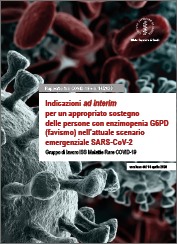Reports mainly addressed to healthcare professionals to cope with different aspects of the COVID pandemic. They provide essential and urgent directions for emergency management and are subject to updates.
They are published in Italian, but they all have an English abstract.
Editing and graphics: Scientific Communication Unit (Sandra Salinetti and Paola De Castro)



